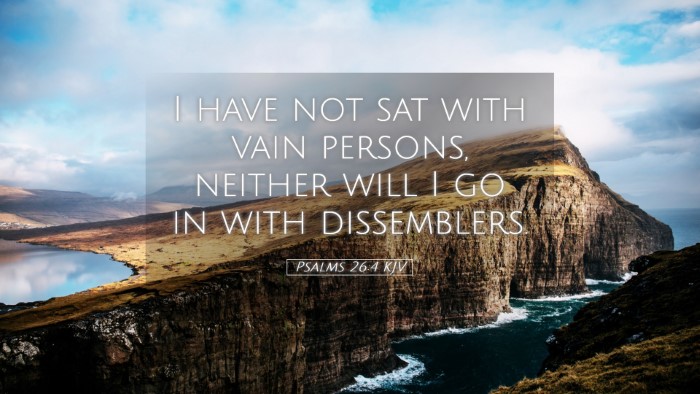Psalms 26:4 Commentary
Bible Verse: "I have not sat with vain persons, neither will I go in with dissemblers." (Psalm 26:4, KJV)
Overview
The Psalmist, in this verse, expresses a clear delineation of his associations and his desire to separate from those who engage in deceitful and empty pursuits. This reflection serves as a profound commentary on personal integrity and the pursuit of righteousness.
Insights from Matthew Henry
Matthew Henry emphasizes the importance of righteous company. In his commentary, he notes that the Psalmist is not only declaring his own integrity but is also making a choice about the company he keeps. He distinguishes himself from "vain persons"—those who are superficial and lacking in true virtue.
- Disassociation from the Wicked: Henry clarifies that sitting with vain persons denotes a comfortable familiarity with those engaged in empty and sinful pursuits. The Psalmist's refusal indicates a conscious decision to uphold his faith and commitment to God.
- Call for Integrity: The Psalmist’s declaration is a personal affirmation of his character and values, underlining the importance of discrimination in social engagements—a necessary stance for cultivating a life that pleases God.
Insights from Albert Barnes
Albert Barnes provides a contextual reflection, emphasizing the moral implications of the Psalmist's distinction of character. He explains that the term "vanity" refers to those engaged in pursuits devoid of true value, and "dissemblers" are those who are hypocritical.
- The Nature of Vain Persons: Barnes highlights that these are individuals whose lives give no glory to God, and whose actions lack sincerity and depth.
- A Public Witness: The Psalmist's declaration serves as a public witness to those around him, emphasizing a lifestyle that draws a line between light and darkness and aspires to demonstrate true righteousness.
- Spiritual Consequences: Barnes warns about the spiritual consequences of mingling with such individuals, suggesting a potential dilution of one's own values and a compromise of moral and spiritual standing.
Insights from Adam Clarke
Adam Clarke adds profound depth by exploring the intent behind the Psalmist’s statement and highlights the psychological and spiritual ramifications of associating with those who do not uphold godly values.
- Distinction and Identity: Clarke underscores that the refusal to associate with "dissemblers" indicates a strong sense of identity rooted in righteousness. The Psalmist's integrity is shown in his unwillingness to blend with the morally ambiguous.
- Affirmation of Faith: There is an expectation that those who choose to live a God-centered life will naturally gravitate towards others who share that commitment. Clarke points to the significance of this choice in reinforcing one’s faith in a community.
- The Defense Against Hypocrisy: By distancing himself from dissemblers, the Psalmist is not only protecting his heart but also establishing boundaries against the insidious nature of hypocrisy that can corrupt one’s faith.
Theological Implications
This verse invites pastors, theologians, and students to reflect on the nature of associations in their own lives. It raises several theological implications:
- Holiness and Separation: The Old Testament often discusses the theme of holiness and separation from sin. The Psalmist's call for separation serves as a reminder for believers to pursue holiness in their daily lives.
- Community and Accountability: The verse opens a discussion about the significance of community. The company we keep profoundly affects our spiritual journeys, and therefore, choosing friends who share one’s values is essential for spiritual growth.
- Witness to the World: The declaration of righteousness becomes a powerful testimony to the onlookers in society, challenging them to reflect on their own associations and choices in light of God’s standards.
Personal Application
For personal application, this verse encourages believers to:
- Evaluate Relationships: Regularly assess the influences in one’s life; identify relationships that uplift and those that may hinder spiritual growth.
- Cultivate Godly Friendships: Seek out and nurture relationships with those committed to the same faith and values for mutual encouragement and accountability.
- Live Distinctively: Embrace the calling to live distinctly as one is set apart for God's purpose, reflecting His love and righteousness in a world full of vanity and deceit.
Conclusion
Psalms 26:4 serves as a significant reminder for believers to engage in a life that honors God through the choices they make, particularly in the company they keep. Drawing from the insights of Matthew Henry, Albert Barnes, and Adam Clarke, it is evident that this verse not only highlights the importance of personal integrity but also serves to fortify one’s faith in a community that encourages righteousness and authentic living.


